Faith Leaders in Secular Spaces: Where Chaplains Fit In


As societal religious affiliations decline and diversify, the role of faith leaders and chaplains extends beyond traditional religious venues into secular, multifaith, and nonreligious settings. This shift reflects a broader understanding of spiritual care as a universal human service, emphasizing compassion, presence, and holistic well-being. This article explores the multifaceted roles of chaplains—religious and secular alike—in these diverse environments, highlighting their functions, training, and contributions to fostering inclusion, understanding, and emotional resilience.
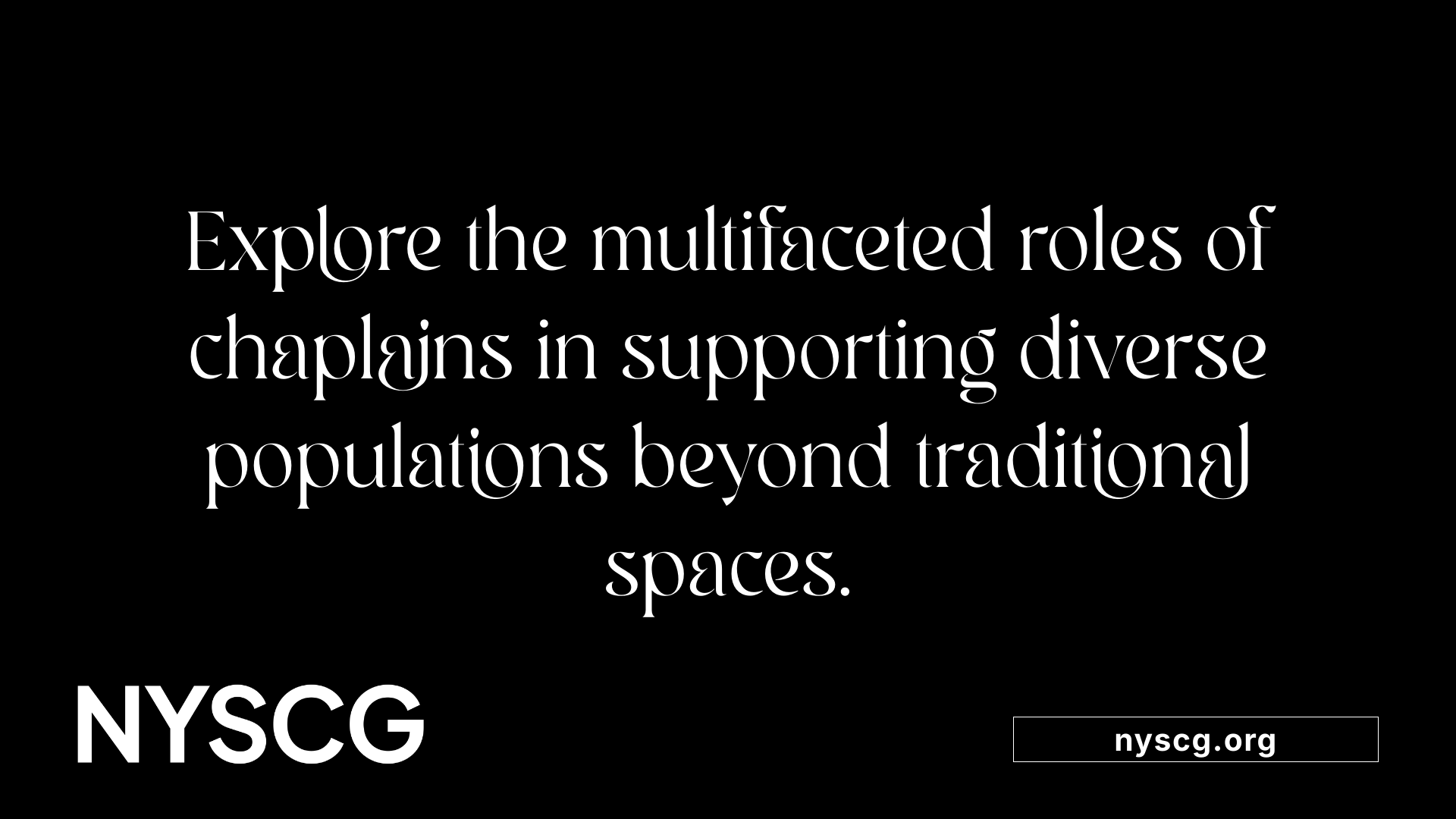
Chaplains serve in a broad range of environments beyond traditional religious venues, including hospitals, prisons, military bases, universities, workplaces, and community centers. Their primary role is to provide spiritual support, emotional care, and conflict resolution, tailored to the diverse belief systems or non-belief orientations of the individuals they serve.
In secular and multifaith contexts, chaplains act as compassionate presence-bearers, embodying biblical and theological principles such as Christ’s incarnational presence. They exemplify active listening, empathy, and love, offering comfort that aligns with gospel values like humility, service, and hope.
Meeting people where they are, they facilitate both religious practices—such as prayer, rituals, or sacraments—and nonreligious acts like offering a listening ear, sitting in silence, or providing practical assistance. This inclusive approach promotes overall well-being, healing, and human connection across all faiths and secular perspectives.
Chaplains usually work within interprofessional teams, mediating between individuals' spiritual or emotional needs and the institutional environment. They respect religious diversity and strive to create welcoming, inclusive spaces, addressing issues such as grief, loss, moral dilemmas, or trauma.
Through their presence and care, they embody core biblical and theological themes like the gospel’s call to love unconditionally, serve others selflessly, and bear witness to hope and life even amidst suffering.
In summary, the functions of chaplains in secular and multifaith settings include providing holistic support that integrates faith-based and secular practices, fostering resilience, and promoting peace and healing for diverse populations.
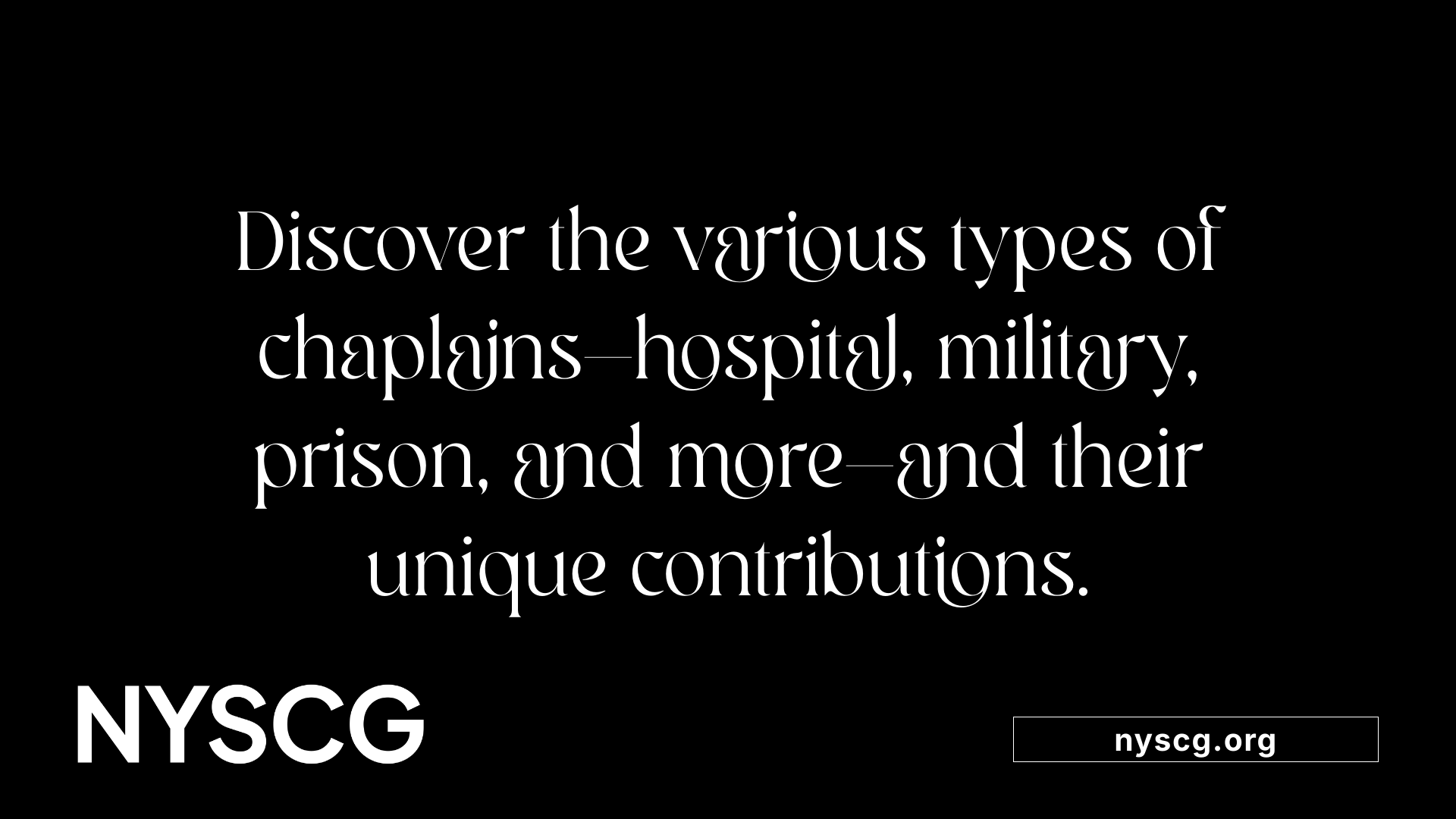
Chaplains serve in a wide array of environments, each with unique roles focused on providing spiritual and emotional support in secular and institutional settings. Understanding these various roles highlights their importance across society.
Hospital and hospice chaplains are dedicated to supporting patients facing illness, injury, or end-of-life situations. They offer comfort, spiritual guidance, and presence to patients, their families, and even hospital staff, respecting each individual’s beliefs or nonbelief. Hospice chaplains, in particular, focus on supporting those nearing death, helping them find peace and meaning.
Prison and jail chaplains work within correctional facilities to provide spiritual guidance and education to inmates. They help inmates find hope, maintain dignity, and explore personal faith or ethics. These chaplains foster personal growth and support rehabilitation efforts.
Military chaplains serve active-duty service members and veterans, both in garrison and in deployments abroad. Their duties include providing religious services, counseling, and moral support. They navigate the diverse spiritual backgrounds of military personnel, emphasizing respect, inclusion, and resilience.
Law enforcement chaplains support police, fire, and emergency medical services (EMS) personnel. They offer crisis support during critical incidents, counseling after traumatic events, and spiritual presence in daily duties. Their role is crucial in helping first responders cope with stress and trauma.
Workplace and community chaplains extend spiritual care beyond traditional settings. Workplace chaplains may serve employees and management, aiding in personal and moral challenges, enhancing workplace cohesion. Community chaplains work in neighborhoods or public spaces, engaging with residents, especially during crises such as natural disasters or social upheavals.
Other specialized roles include school chaplains, government chaplains, disaster response chaplains, and crisis response chaplains. These professionals adapt their services to specific groups, addressing particular needs like grief, moral dilemmas, or trauma recovery.
The variety of these roles exemplifies how chaplaincy adapts to serve diverse populations within secular institutions, emphasizing care, presence, and support rather than solely religious instruction.
| Type of Chaplain | Main Focus | Supported Populations | Settings | Specific Roles |
|---|---|---|---|---|
| Hospital Chaplains | Emotional and spiritual support | Patients, families, staff | Hospitals, clinics | Crisis intervention, spiritual counseling |
| Hospice Chaplains | End-of-life support | Terminally ill, families | Hospice care | Comfort, legacy, ethical guidance |
| Prison/Jail Chaplains | Spiritual growth, education | Inmates | Correctional facilities | Faith-based programs, moral mentoring |
| Military Chaplains | Religious services, moral support | Soldiers, veterans | Military bases, deployments | Counseling, religious rites, resilience training |
| Law Enforcement Chaplains | Crisis support, counseling | Police, fire, EMS | Emergency scenes, stations | Trauma response, moral guidance |
| Workplace Chaplains | Personal and moral support | Employees, management | Corporate offices, factories | Conflict resolution, stress management |
| Community Chaplains | Secular and diverse community support | Residents | Neighborhoods, public events | Outreach, crisis support, interfaith dialogue |
Chaplains in each of these roles exemplify a deep commitment to being present and supportive, respecting individual beliefs whether religious or secular. Their work demonstrates the evolving nature of spiritual care in society, blending traditional compassion with contemporary understanding of diverse worldviews.
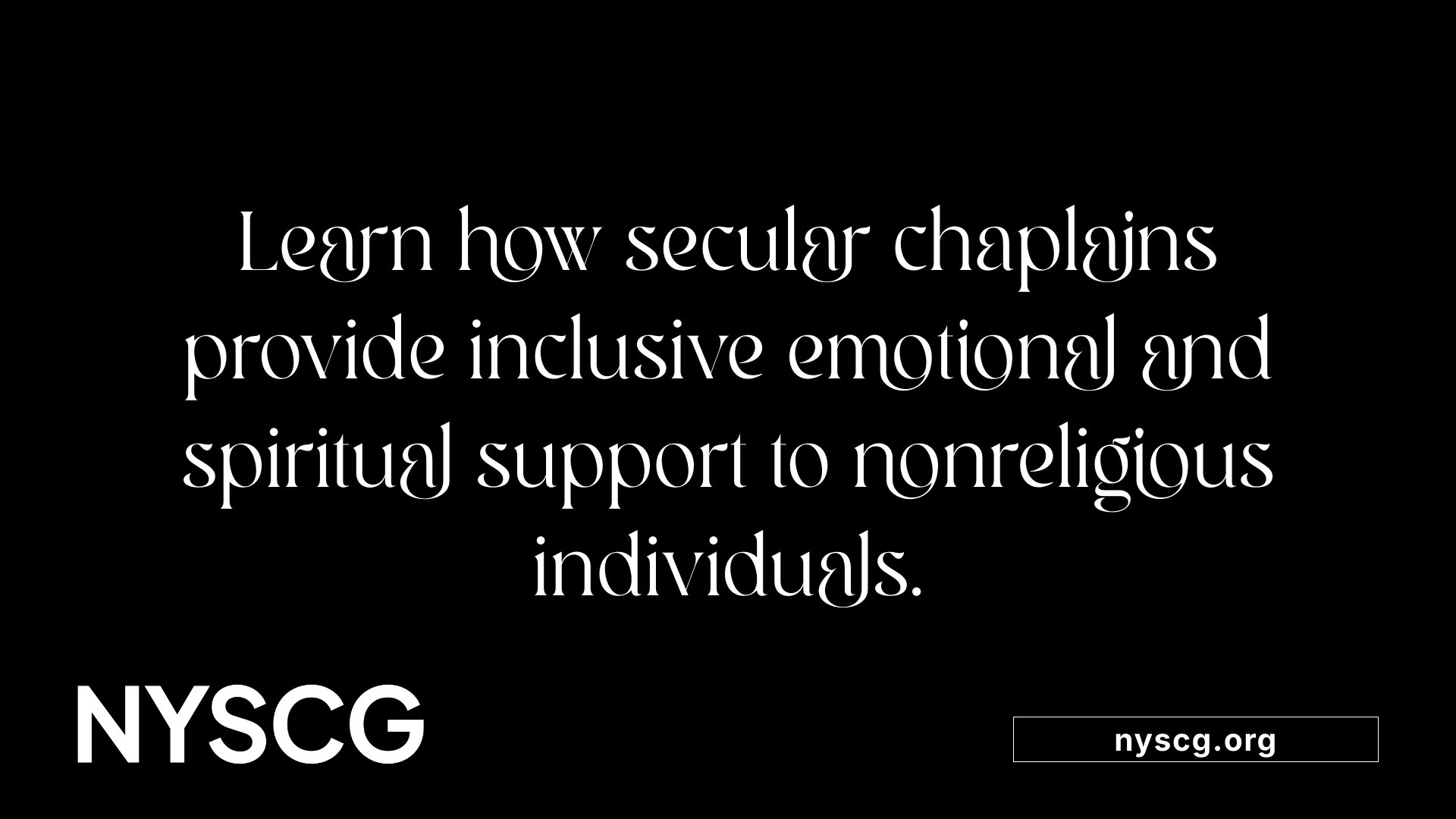
A secular chaplain is a professional trained in providing spiritual and emotional support in secular environments such as hospitals, universities, prisons, and workplace settings. Unlike traditional faith-based chaplains who serve specific religious communities like Christians, Jews, or Muslims, secular chaplains often identify as atheists, agnostics, or humanists. Their focus is on supporting individuals’ well-being through a nonreligious lens, emphasizing universal concepts such as empathy, human dignity, and personal meaning.
Traditional religious chaplains usually operate within specific faith frameworks and may follow prescribed doctrines. In contrast, secular chaplains do not promote a particular belief system but meet people where they are emotionally and spiritually. They facilitate conversations about life's big questions, grief, hope, and resilience, often using philosophical, humanist, or evidence-based approaches.
Their training involves clinical pastoral education (CPE) and adheres to professional standards comparable to those of religious chaplains. This training emphasizes relational skills, emotional intelligence, and cultural competency. Secular chaplains aim to provide inclusive care, respecting diverse backgrounds and belief systems, including nonreligious perspectives.
Overall, these chaplains broaden the scope of spiritual support in society, offering compassionate presence and meaningful assistance to those who may not adhere to any religion but still seek understanding, comfort, and connection.
One central role of secular chaplains is supporting individuals who identify as nonreligious, helping them find personal strength and purpose amid life's challenges. They promote a sense of human dignity and ethical integrity, regardless of religious belief.
This approach prioritizes empathy, active listening, and unconditional support. Secular chaplains help people explore their values, confront mortality, or navigate mental health concerns, all without religious references or rituals.
By creating safe spaces for open dialogue, they foster a sense of community and compassion in settings that are increasingly diverse and secular.
Secular chaplains undergo specialized education to prepare for their roles. Most participate in Clinical Pastoral Education (CPE), which emphasizes practical skills like active listening, ethical decision-making, and emotional resilience.
Although their training may include elements of theology, it is adapted to secular and pluralistic contexts. Programs focus on relational competence, cultural awareness, and understanding various belief systems—including nonbeliefs.
Many institutions advocate for professional standards similar to those established for religious chaplains, ensuring quality care and accountability.
In recent years, some universities and professional organizations have developed specific curricula tailored for humanist or nonreligious pastoral care. These courses articulate the unique skills needed to serve diverse populations effectively.
Ultimately, secular chaplains operate within a framework that values lifelong learning, ethical integrity, and compassion—aiming to provide meaningful support irrespective of individuals' religious affiliations or lack thereof.
| Aspect | Details | Additional Notes |
|---|---|---|
| Definition | Support providers for nonreligious and humanist populations | Include atheists, agnostics, spiritual-but-not-religious |
| Approach | Focus on empathy, personal meaning, human dignity | Emphasizes universal human experiences |
| Training | Clinical Pastoral Education, professional standards | Tailored curricula for secular and pluralistic care |
| Settings | Hospitals, universities, prisons, workplaces | Increasing presence in secular environments |
| Purpose | Meet individuals at their current state, provide comfort and understanding | No reliance on religious doctrine |
This evolving sector exemplifies how spiritual care continues to adapt to society’s growing diversity. Secular chaplains are integral in making spiritual support accessible and meaningful for all, regardless of faith or belief system.
Chaplains operating in diverse and secular settings bear the crucial task of offering emotional, spiritual, and cultural support tailored to individuals from a multitude of belief backgrounds, including those who identify as atheists, agnostics, or spiritual but not religious. Their fundamental responsibility is to serve as compassionate bridges, facilitating open dialogue and understanding among people of differing worldviews.
In practice, these chaplains provide crisis intervention, assist with end-of-life care, and conduct rituals or ceremonies that respect personal beliefs. Regardless of specific faith traditions, they aim to create a safe space where individuals feel heard and supported. A central skill they bring is active listening — attentively engaging with individuals to understand their unique needs and perspectives.
Cultural competence is equally vital. Effective chaplains are adept at navigating complex cultural and belief systems, demonstrating neutrality and respect without imposing their own views. This requires sensitivity and awareness of various traditions, identities, and worldviews.
Training for chaplains in these roles typically involves extensive theological, pastoral, and clinical education. Many pursue higher education in related fields, participate in Clinical Pastoral Education (CPE), and obtain endorsements from religious or secular organizations that affirm their capacity to serve diverse populations.
In environments where religious belief varies widely, skills for navigating such diversity are essential. Chaplains must manage sensitive conversations around spirituality and ethics, often in high-stakes contexts like healthcare, military, or prisons. Their overarching goal is to foster well-being, resilience, and spiritual or existential growth — regardless of the individual's specific faith stance.
In summary, chaplains working in pluralistic and secular spheresoperate as versatile caregivers and facilitators of spiritual and emotional health. They uphold principles of inclusivity, neutrality, and compassion, ensuring that each person receives respectful and meaningful support in their personal journey, whether religious or secular.
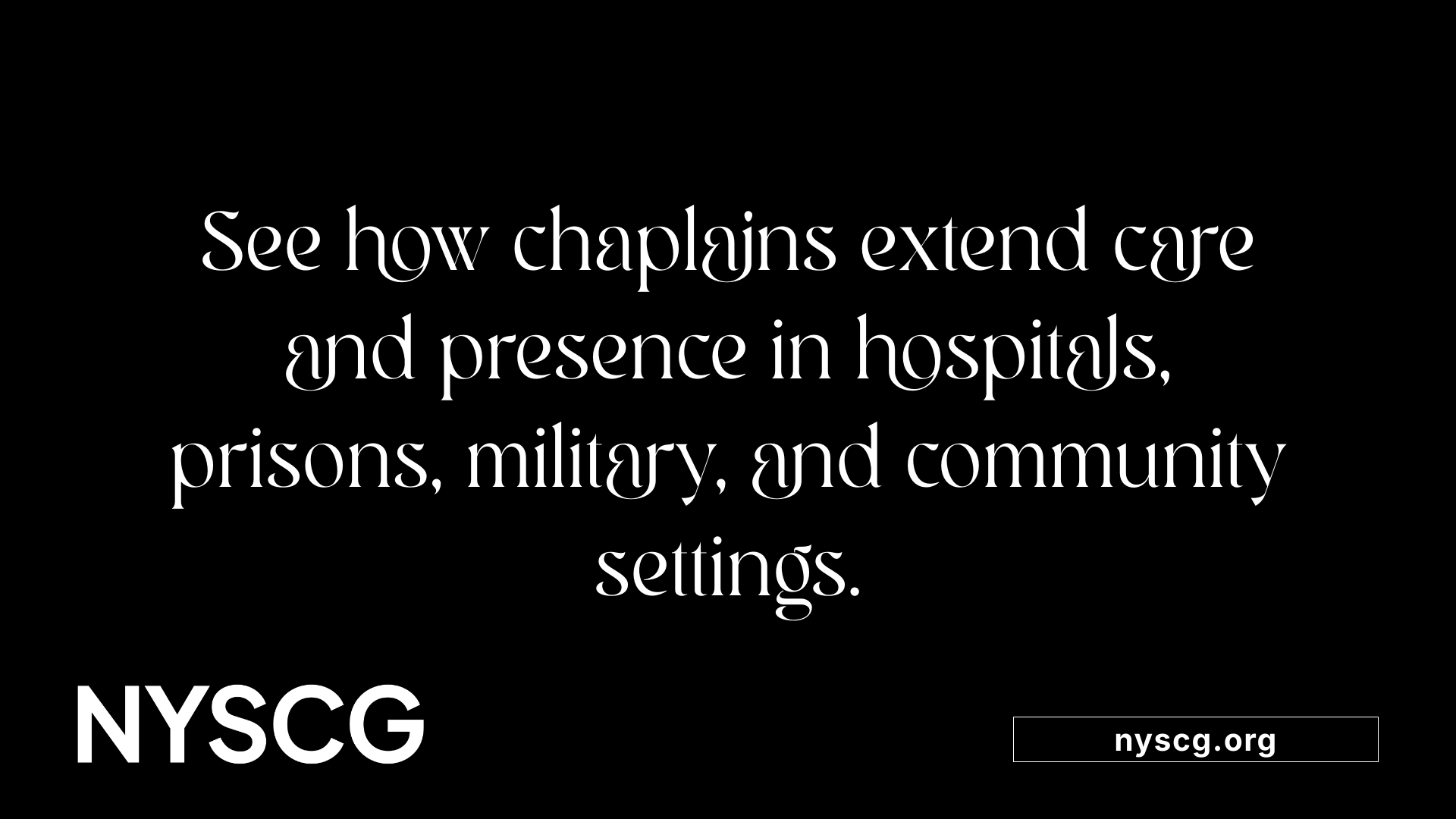
Chaplains have increasingly taken on roles beyond the confines of churches and religious communities. Today, they serve in secular settings like hospitals, prisons, the military, universities, disaster zones, and public institutions. Their primary focus is offering spiritual and emotional support, often in situations marked by trauma, loss, or moral dilemmas, regardless of the individual's faith or belief system.
In hospitals, chaplains provide comfort to patients facing illness, trauma, or end-of-life decisions. They meet individuals where they are—whether religious, spiritual, or secular—by listening, praying with, or just sitting alongside them. In prisons, chaplains foster moral and emotional resilience, supporting inmates through personal growth and reconciliation.
Military chaplains serve on the frontlines and in conflict zones, offering pastoral care to service members of various faiths and nonreligious backgrounds. They provide rites of passage, ethical counsel, and crisis intervention, often under extreme circumstances. Their presence offers a sense of stability and hope amid chaos.
In secular institutions such as universities and workplaces, chaplains function as
Training is crucial for chaplains tasked with serving in settings marked by diversity and secularism. It equips them with the skills needed to address a broad spectrum of spiritual, emotional, and cultural needs, regardless of individuals' belief systems.
Formal education forms the foundation of this preparation. Many chaplains pursue degrees in theology, religious studies, or increasingly, in humanism, which provide essential knowledge about various faiths and secular philosophies. This background helps chaplains understand the beliefs, values, and traditions of the populations they serve.
In addition to academic grounding, specialized training such as Clinical Pastoral Education (CPE) plays a vital role. CPE offers practical, hands-on experience in pastoral care, emphasizing active listening, empathy, and ethical practice. It prepares chaplains to navigate complex situations often encountered in healthcare, military, and community settings.
Standards and certification by recognized professional organizations help maintain quality and accountability. These credentials ensure that chaplains meet rigorous benchmarks of competence, professionalism, and ethical conduct. Certification processes often include peer review, continuing education, and supervised practice.
Ongoing professional development is equally important, allowing chaplains to stay current with emerging issues, cultural sensitivities, and best practices. Many participate in workshops, seminars, and secular chaplaincy programs focused on intercultural competence and secular ethics.
Such comprehensive training enhances a chaplain’s capacity to serve effectively in pluralistic environments. It fosters respect for diverse beliefs, encourages cultural humility, and promotes compassionate care that honors each person’s dignity.
Successfully navigating the challenges of secular and multicultural settings demands that chaplains continue learning and adapting. Their training ensures they are not only knowledgeable but also emotionally intelligent, resilient, and capable of forming meaningful connections with those they support.
| Aspect | Description | Additional Detail |
|---|---|---|
| Formal Education | Degrees in theology, humanism, or religious studies | Building foundational knowledge of faiths and secular beliefs |
| Clinical Pastoral Education | Practical, supervised field training | Enhances interpersonal skills and ethical practice |
| Certification | Credentialing by professional bodies | Ensures standards of competence and ethics |
| Continuing Education | Workshops, seminars, secular chaplaincy programs | Keeps skills aligned with current needs and cultural sensitivities |
| Cultural Competence | Training in intercultural and interfaith understanding | Promotes respectful, effective care in diverse settings |
Each element of training addresses specific needs encountered in diverse settings. Academic degrees foster awareness and understanding of different worldviews. CPE and ongoing education sharpen practical skills essential for compassionate engagement. Certification offers reassurance of professional integrity, and intercultural training builds competence in addressing varied belief systems with respect and sensitivity.
Together, these components create a robust foundation, enabling chaplains to serve as authentic, empathetic presence in secular institutions, fostering inclusion, acceptance, and spiritual well-being for all individuals regardless of background.
Faith leaders and chaplains play a vital role in providing spiritual guidance and emotional support in today's increasingly diverse and secular environments. Unlike traditional religious figures confined to specific congregations, they serve in hospitals, prisons, universities, military institutions, and workplaces—spaces often characterized by a mix of beliefs and worldviews.
Their primary contribution lies in offering comfort and understanding beyond doctrinal boundaries. They facilitate respectful dialogue among individuals of various faiths and beliefs, fostering an atmosphere of mutual respect and peaceful coexistence. For instance, secular chaplains like Greg Epstein at Harvard or Muslim chaplains working with interfaith communities emphasize the importance of listening, empathy, and presence—values rooted in their respective spiritual traditions—aimed at bridging differences.
Chaplaincy involves not only supporting individuals during crises such as illness, grief, or trauma but also mediating conflicts that may arise from religious misunderstandings or social tensions. They often serve as neutral parties who can navigate complex intergroup dynamics, helping to de-escalate potential conflicts with compassion and clarity.
In practice, chaplains draw on ethical principles found across faiths—such as love, humility, and service—to model behaviors that promote social harmony. Their work includes addressing societal issues like religious intolerance, Islamophobia, or secularism's marginalization of faith, by offering spaces for open discussion and reconciliation.
Moreover, faith leaders are increasingly engaging in partnerships with community groups and governmental agencies. These collaborations aim to develop programs that enhance social cohesion, protect religious freedoms, and support ethical behavior founded on shared human values.
Overall, faith leaders and chaplains serve as bridges—emphasizing common humanity, fostering understanding, and helping communities navigate differences peacefully.
Chaplaincy within increasingly diverse and secular environments faces unique opportunities and obstacles. Central to effective practice are principles such as cultural competence, humility, empathy, and a non-judgmental approach. These elements help chaplains connect meaningfully with individuals from varied backgrounds, religions, and belief systems.
Cultural literacy is vital; chaplains must comprehend and respect diverse religious, cultural, and personal practices. This understanding fosters an atmosphere of mutual respect and inclusion, allowing individuals to feel seen and supported regardless of their beliefs.
Serving people across different axes of identity—race, ethnicity, gender, socio-economic status, and more—requires chaplains to operate with sensitivity. Balancing the need for cultural appropriateness with the goal of providing spiritual and emotional support is often complex.
One significant challenge in multicultural chaplaincy is resolving conflicts that arise when cultural values or religious beliefs differ sharply. Chaplains must navigate these conflicts with compassion and tact, ensuring that no individual feels disrespected or marginalized.
To meet these challenges, ongoing learning and cultural translation skills are essential. Chaplains need to adapt their support strategies to align with individuals' values, facilitating understanding and decreasing feelings of alienation. This dynamic process involves continuous self-reflection, education, and flexibility.
Overall, effective multicultural chaplaincy is grounded in respect and open-mindedness, fostering environments where diverse individuals can find comfort, inclusion, and meaningful support during life's critical moments.
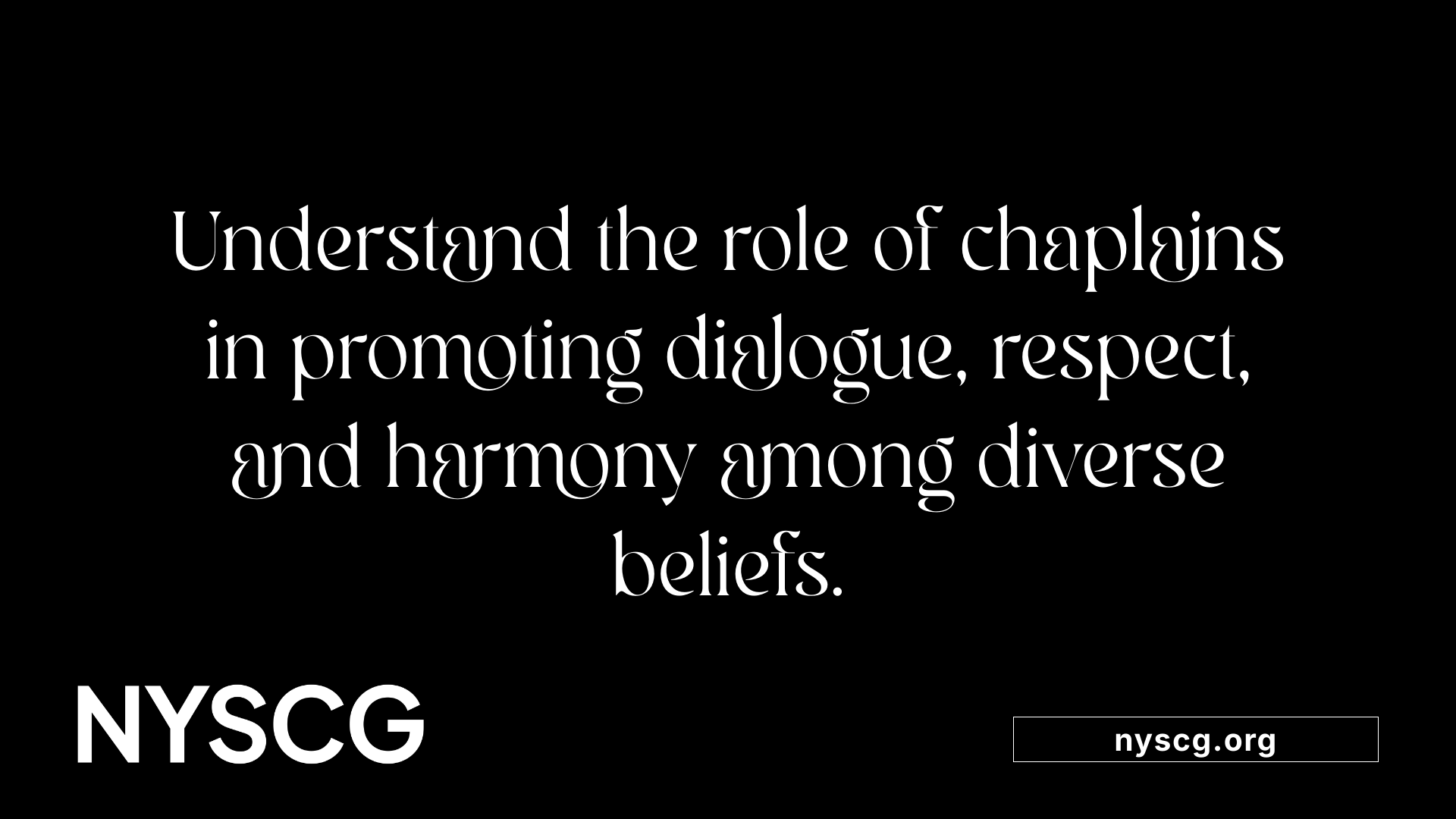
Historically, chaplains have been essential figures providing spiritual support within religiously pluralistic settings like the military, hospitals, and prisons. Originally rooted in specific faith traditions—particularly Christianity—chaplains expanded their roles to include various religious denominations as societies became more diverse. With this evolution, a broader recognition emerged that spiritual care should respect and serve individuals of all faiths and none.
Today, interfaith and secular chaplains actively promote dialogue and understanding among diverse belief systems. They serve as bridges, facilitating communication between people of different religious backgrounds and secular identities. Their work emphasizes mutual respect, empathy, and moral cooperation, crucial in environments such as hospitals, military bases, and universities.
Many contemporary chaplains are trained in intercultural and interfaith competencies through specialized certification programs. These programs focus on cultural literacy, ethical practice, and inclusive rituals, enabling chaplains to offer support that honors individual belief systems without proselytizing.
For secular practitioners like humanist chaplains, the focus shifts from supernatural beliefs to human-centered values. They emphasize ethics, community involvement, and personal meaning, expanding the traditional concept of spiritual care beyond religious boundaries.
Chaplains' roles in promoting interfaith dialogue involve creating inclusive environments where individuals feel respected and understood. They foster shared human experiences—like grief, hope, or moral reflection—allowing diverse perspectives to coexist and enrich communal understanding.
In secular settings, these chaplains often work to address existential concerns and provide support that aligns with individuals' beliefs and values, whether spiritual, humanist, or agnostic. Their presence enables institutions to embrace diversity fully and to nurture environments of mutual respect and cooperation.
Summary of Their Roles and Contributions:
| Aspect | Description | Impact |
|---|---|---|
| Historical Roots | Originated from religious institutions, expanded to include diverse faiths | Provided spiritual support across different religions and growing secular populations |
| Contemporary Focus | Promote interfaith dialogue, support secular identities | Foster mutual understanding, reduce conflict, and build inclusive communities |
| Training & Skills | Interfaith competency, cultural literacy, ethics | Enable respectful, effective support that recognizes individual belief systems |
| Main Goals | Respect diversity, facilitate shared spiritual and moral experiences | Enhance community cohesion and promote moral cooperation |
| Challenges | Addressing misconceptions, balancing religious and secular needs | Promotes greater acceptance and understanding across belief boundaries |
Overall, interfaith and secular chaplains serve as vital connectors—nurturing understanding and cooperation in an increasingly diverse society, and broadening the scope of spiritual care to include all individuals regardless of their faith or belief system.
The landscape of spiritual care in secular and diverse settings is expanding, driven by a recognition of the importance of inclusive, empathetic, and culturally competent support. Faith-based and nonreligious chaplains serve as vital connectors—embodying presence, offering comfort, fostering understanding, and promoting human dignity across belief boundaries. Their specialized training, adaptability, and commitment to compassion ensure that they meet individuals wherever they are—spiritually, emotionally, and psychologically—creating a more compassionate, understanding, and pluralistic society. As secular spaces continue to evolve, the integration of faith leaders and secular professionals in spiritual care will be essential in nurturing resilience, community cohesion, and mutual respect.
All you need is the will to make the world a better place.
New York State chaplain group inc. is a tax deductible organization with a federal tax Id number 92-383-4921